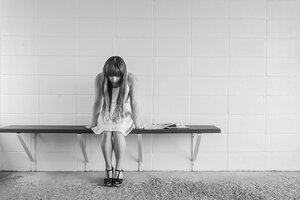Study reveals that a high percentage of children and adolescents with early onset psychosis suffer from clinical depression
A study carried out by researchers from the Institut Sant Joan de Déu and the Parc Sanitari Sant Joan de Déu reveals that a high percentage of children and adolescents with early onset psychosis suffer from clinical depression. The article has been published in the scientific journal European Child & Adolescent Psychiatry.
Early onset psychosis is defined as the beginning of the psychotic symptoms before the age of 18. Some studies argue that the age of onset of the first psychotic episode is a clinical characteristic indicative of the course of the disease and is associated with greater psychopathological disorders. On the other hand, clinical depression is a mood disorder in which feelings of sadness, loss, anger, or frustration interfere with daily life.
Many studies demonstrate the importance of the relationship between early onset psychosis and clinical depression and even point out that children and adolescents may suffer from high levels of depressive symptoms. However, analyzing this relationship is really complex. It has been seen that some of the symptoms of these two disorders are similar, especially the so-called negative symptoms such as anergia or poverty of speech. Therefore, this overlap of symptoms makes it difficult to differentiate depressive symptoms in young people suffering from psychotic episodes.
Despite the importance of this relationship between early onset psychosis and clinical depression, there are not many studies that analyze it in detail. And, in addition, the few studies that exist focus on the adult population. Therefore, the aims of the study were to examine the frequency of presence and types of depressive symptoms in children and adolescents who have suffered the first psychotic episode and also to assess the relationship between depressive symptoms and psychotic symptoms.
The relationship between early onset psychosis and depression
Researchers, made up of professionals in psychiatry, clinical psychology and neuropsychology, have analyzed more than 60 patients between the ages of 7 and 17 in the Sant Joan de Déu network who have suffered the first episode of early psychosis. To do this, they performed a complex evaluation that included clinical aspects to compare psychotic symptoms in both groups: the group with the presence of depression and the group with the absence of depression. The results indicated that a high percentage of patients who had suffered the first episode of early onset also suffered from depression.
"We have seen that the most common symptoms of depression are associated with the level of schooling and that the presence of depression is associated with negative, affective and excitatory symptoms. Instead, self-esteem, school problems, negative affectation and biological deregulation are associated with psychotic symptoms" says Dr Susana Ochoa, head of the senior group in Ethiopathogenesis and treatment of severe mental disorders (MERITT).
The results of this study show the need for appropriate tools to measure and determine more specifically the clinical symptoms of depression in children and adolescents with a first psychotic episode. The work done by Sant Joan de Déu has set a precedent to a better understanding of the relationship between depression and early onset psychosis and also has helped develop more specific treatments in the future.
Reference paper
Calderon-Mediavilla M, Vila-Badia R, Dolz M, Butjosa A, Barajas A, Del Cacho N, Sánchez B, Pardo M, Baños I, Usall J, Ochoa S; GENIPE Group; PROFEP Group. Depressive symptoms and their relationship with negative and other psychotic symptoms in early onset psychosis. Eur Child Adolesc Psychiatry. 2021 Sep;30(9):1383-1390. doi: 10.1007/s00787-020-01618-0. Epub 2020 Aug 31. PMID: 32865655.

The results of this study show the need for appropriate tools to measure and determine more specifically the clinical symptoms of depression in children and adolescents with a first psychotic episode.
